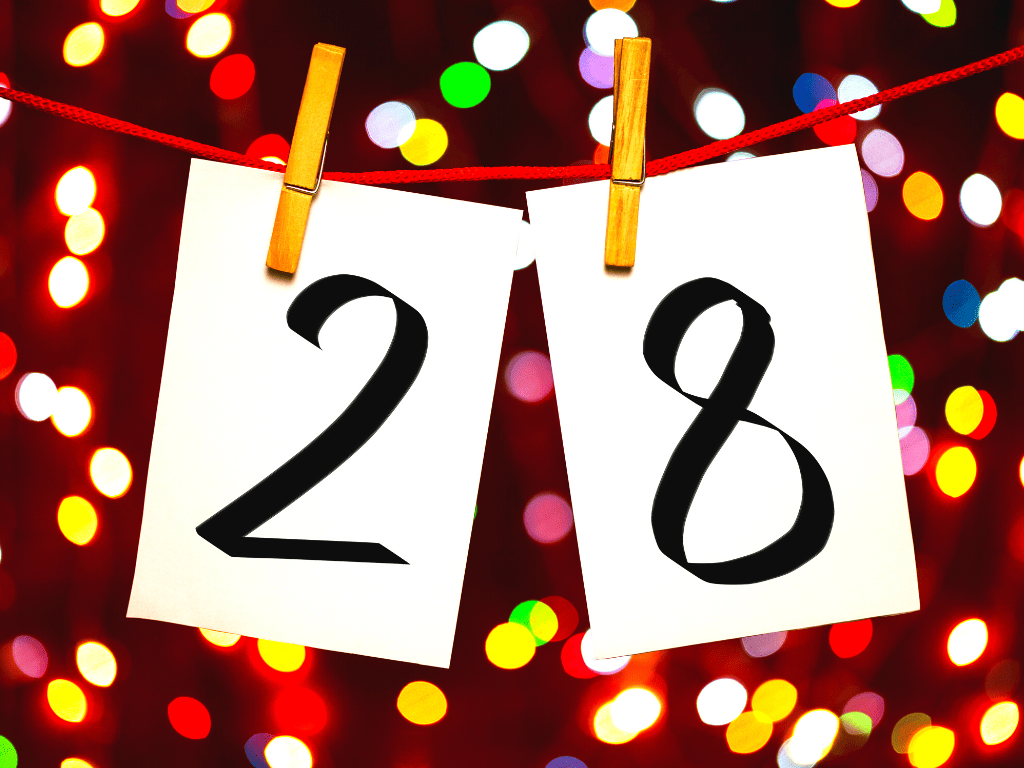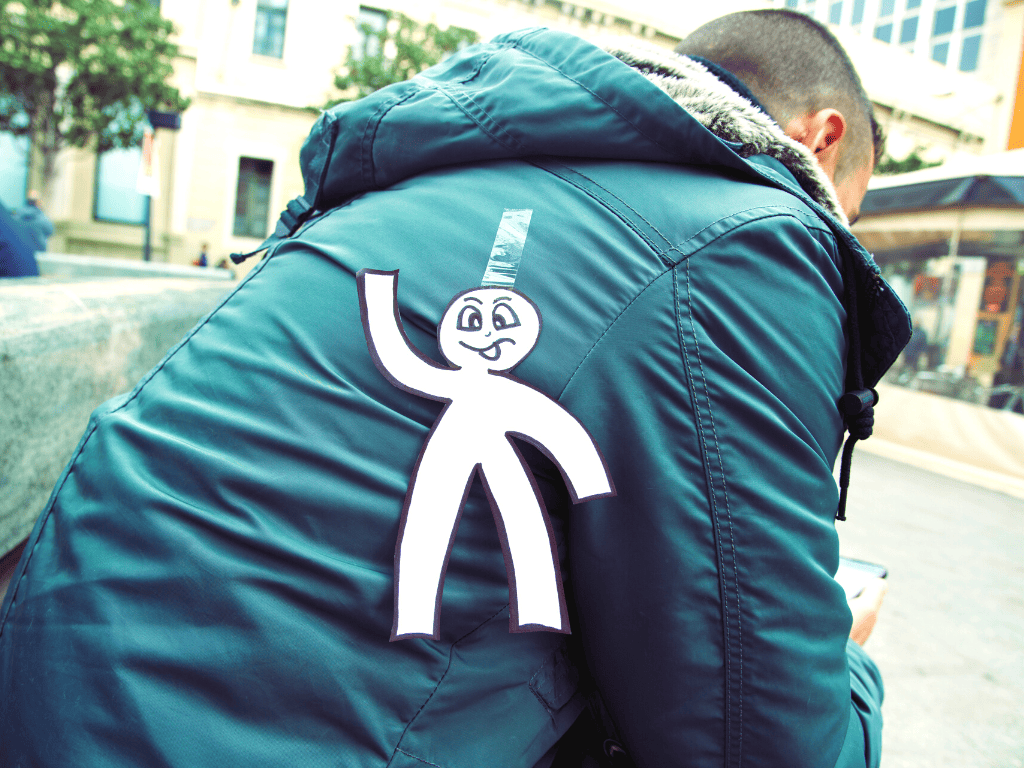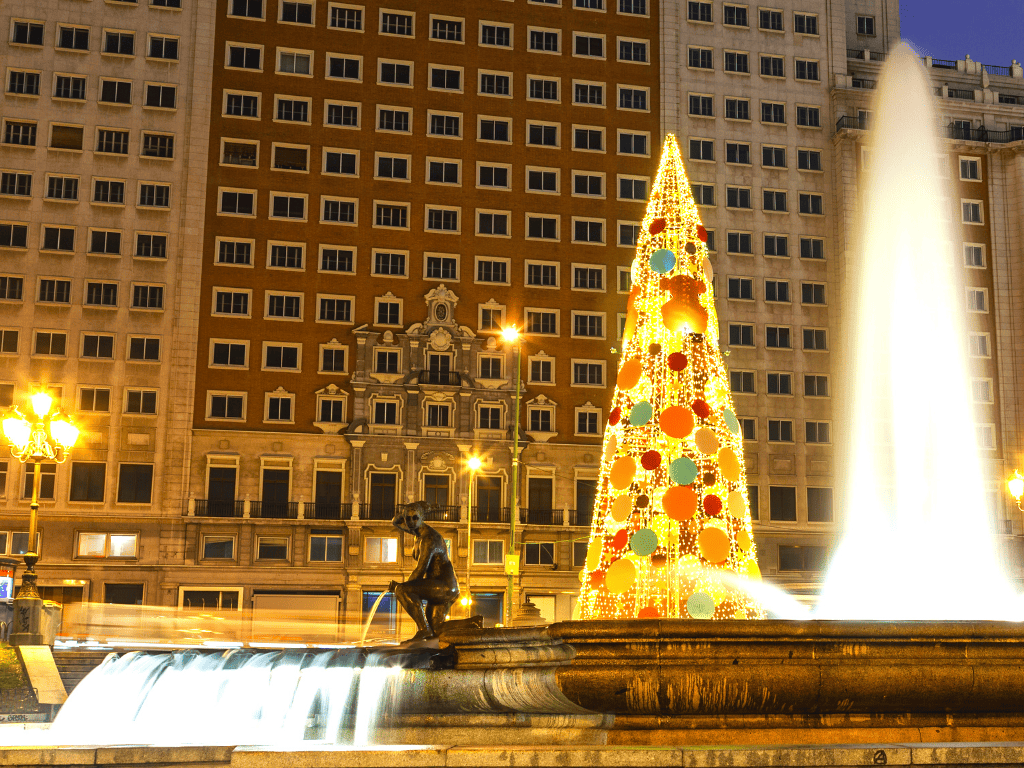What is Día de los Inocentes? (April Fools’ Day in Spain)
Learn about Día de los Inocentes in Spain—the Spanish April Fools’ Day celebrated in December!
Heading to Spain for the holidays? Then you’d better watch your back on December 28th! If not, you might just end up with a little paper man taped to your back…
This is because smack in the middle of Christmas and New Year’s celebrations, Spain celebrates a lesser-known holiday called “El Día de los Inocentes.”
But, what is Día de los Inocentes? And what does it have to do with practical jokes?
In this blog post, we’ll tell you all about Día de los Inocentes in Spain from our perspective having lived in Spain. From what Día de los Inocentes is, how it started, if it’s related to April Fools Day, and how you can take part in celebrating this very special holiday in Spain!
Does Spain Have April Fools’ Day? (El Día de los Inocentes)

We all know April Fools’ Day is celebrated with harmless pranks and hoaxes. But did you know that Spain has its own version of this holiday?
To explain, Spain doesn’t celebrate April Fools’ Day on April 1st. But, Spaniards do have a very similar observance. And in true Spanish fashion, it’s done up in a big way!
Spain’s version of April Fools is called El Día de los Inocentes (or Day of the Holy Innocents in English).
A holiday with biblical origins, Día de los Inocentes is celebrated every year on December 28th. Taking place in the middle of the Christmas season, it’s a lighthearted celebration heavy in tradition. (By the way, Christmas in Spain runs generally runs Christmas Day through Epiphany on January 6th).
What is Día de los Inocentes in Spain?

Día de los Inocentes is a holiday similar to April Fools’ Day in the United States (and other countries).
On this day, it’s customary to play practical jokes on each other. These pranks can range from harmless jokes to elaborate hoaxes, but they are always played in good fun, never with malicious intent.
Although Día de los Inocentes isn’t a public holiday in Spain (in other words, you don’t get off work or school), some cities and towns in Spain hold public celebrations on December 28th. These include parades, street performances, town parties, and other festive activities (We’ll get into the best places to celebrate Día de los Inocentes later in this guide).
Origins of El Día de Los Inocentes in Spain

While the origins of April Fools’ Day are unclear, El Día de los Inocentes has a more concrete history.
Día de los Inocentes is named after the biblical account of King Herod’s brutality in Matthew 2:1-18.
After he heard of the birth of Christ, King Herod asked the Magi to report to him the child’s whereabouts. The Magi (or three Wise Men, Three Kings) then followed the star to Bethlehem, where they found the newborn lying in a manger and bestowed gifts upon Him. Having been warned in a dream not to go back to Herrod, they left via a different route.
When Herrod learned he had been outwitted by the Magi, he ordered all infant boys under the age of two in Bethlehem and its vicinity to be killed. This was done in an attempt to kill the infant Jesus seeing as Herod viewed Him as a threat to Herod’s power.
However, Joseph and Mary had already fled to Egypt with the child. This after an angel of the Lord had appeared to Joseph in a dream warning him of Herrod’s plan.
In the 4th or 5th Century, the Latin Church established the celebration of the Day of the Holy Innocents to commemorate the loss of the Santos Inocentes or “Holy Innocents” (called such by the Church of Rome because they were too young to have committed any sins).
While the holiday was initially a solemn occasion, it has evolved into a fun-filled holiday in Spain. It’s not clear exactly how or when the holiday morphed into a day known for its practical jokes and lively regional events, but some say it dates to the Middle Ages.
How is Día de los Inocentes Celebrated in Spain?

Similar to April Fools’ Day, Día de los Inocentes is a time for general silliness. People of all ages participate in different pranks and festivities all over Spain. In this section, we’ll go over how Spaniards typically celebrate on December 28th.
Practical Jokes (Inocentadas) in Spain
On Día de los Innocentes, it is customary to play pranks and practical jokes called inocentadas on each other. Innocentada translates to April Fools’ joke (or literally “joke of the Holy Innocents”).
The prank most associated with Holy Innocents Day is to tape a paper cutout (monigote) on the back of a friend, colleague, or passer-by without them noticing.
The people who are tricked are referred to as inocentadas, or “innocents.” When the prank is revealed, the tricksters shout, “¡Inocentada!” (comparable to how Americans say, “April Fools!”
It’s also common to see gag gifts for sale at Christmas markets and stores throughout Spain. These might include fake lottery tickets, trick candles, wigs, itching powder, or false ink, for example.
One thing’s for sure—whether a simple gag or elaborate hoaxes, these pranks are meant to be playful and humorous!
Spanish Media & Social Media
In Spain, El Día de los Inocentes is widely celebrated through various forms of media.
Spanish newspapers, television networks, and radio stations often include fake news reports (to be revealed later), humorous skits, or pranks on the day.
Social media platforms such as Instagram and X are also popular mediums for engaging in the holiday. Many Spanish users (including businesses) share jokes, memes, or other humorous content with their audience.

Church Observances in Spain
While modern-day observes of Día de los Inocentes is largely secular in nature, it remains an important holiday for the Catholic Church as well as for several other denominations around the world.
Many churches hold special masses or services in remembrance of the Holy Innocents.
If you’d like to attend, most Catholic churches have their mass times posted outside.
Gala Inocente & Charity Events
The Day of the Innocents is not only a day of laughter and mischief but also a day to give back to worthy children’s causes.
One of the biggest events is the Gala Inocente. Since 1995, this charity gala has been broadcast on Spanish television and aims to raise funds for organizations dedicated to children and families in Spain.
Other towns and organizations also raise money in a manner of different ways such as benefits concerts or other special programming.
Where to Celebrate Día de los Inocentes in Spain
If you’re looking to celebrate Día de los Innocentes in Spain, there are many local towns to choose from. Here are some of the best festivals in Spain on December 28th:
Los Enharinados, Ibi
With more than 10,000 eggs and almost 1,500 pounds of flour, residents in Ibi, Alicante celebrate Los Enharinados (Els Enfarinats in Valencian) in a very messy way!
In this traditional festival dating back 200+ years, a group of residents armed with bags of flour, eggs, and firecrackers take to the streets in a mock coup d’état.
It’s a spectacular battle you’ll have to see to believe! Watch scenes from Los Enharinados ⤵
La Danza de los Locos y El Baile del Oso, Fuente Carreteros
The small town of Fuente Carreteros in Córdoba celebrates Día de los Inocentes with two unique celebrations known as the “La Danza de los Locos” y “El Baile del Oso.”
Participants dress in brightly colored costumes while dancing to the sound of drums and flutes. The tradition, which has been passed down orally, represents the massacre organized by King Herod.
See the “Crazy People’s Dance” ⤵
Día de los Locos, Jalance
In the town of Jalance, located in the province of Valencia, December 28th is marked by Día de los Locos (Crazy People’s Day in English).
During the festival, a handful of young residents (the “locos” or “fools”) dressed in outlandish costumes take over the government for the day!
The festivities last for hours with los locos wreaking havoc in the streets for a good laugh. The evening ends with a big open-air party to which the entire town is invited.
Obispillo, Burgos, Palencia & Murcia
El “Obispillo” is a Holy Innocents tradition that various cities in Spain observe. During the celebration, a little boy or girl gets to play “bishop” for a few hours. (Obispillo is “bishop” in Spanish.)
Dressed in elaborate robes, the bishop is carried through the streets before blessing the town’s residents. The bishop also distributes candies to parade-goers.
Watch the “Obispillo” in Burgos ⤵
El día del diablo, Setiles
In Setiles, Castile-La Mancha, a man dressed as the devil walks around town with a band of young men known as “quintos”. They play pranks, wake townspeople with a trumpet, cause mischief during mass, light bonfires, and collect donations for the town feast.
As the day progresses, children will try to catch the devil’s tail, causing him to chase them with his wooden sword!
The “Day of the Devil” celebrations culminate with a big meal and dance.
El Levantamiento del Ninot, Tremp
In the small Catalan town of Tremp, townspeople celebrate the Holy Innocents with a giant paper doll called an ilufa. According to folklore, Ilufas are mischievous little beings who laugh, mock, and worry innocent people.
The ilufa (or ninot) is raised to the top of the bell tower before later being cut down and burned!
Throughout the day, lots of chicanery ensues before the parade, burning of the ninot, and a festival ending with hot chocolate.
See the raising of the ilufa in Tremp ⤵
Spain’s Día de los Inocentes: FAQs
Still wondering about Spain’s version of April Fools? Here are the answers to some of the most frequently asked questions online:
What are some alternative names for Día de los Inocentes?
In Spanish-speaking countries, Día de los Inocentes is also known as El Día de los Santos Inocentes or El Día de los Inocentes.
What countries celebrate Día de los Innocentes?
Many Spanish-speaking countries including Spain, Mexico, El Salvador, Colombia, and Venezuela celebrate Día de los Inocentes.
What is the English of Día de los Inocentes?
The English translation of Día de los Inocentes is the “Day of the Innocent Saints,” or the “Day of the Holy Innocents” or “Holy Innocents Day.”
What Food is Eaten on Día de los Inocentes in Spain?
There isn’t a typical menu for the Día de los Inocentes in Spain. However, certain regions may include typical fare in their celebrations.
What is the Spanish holiday on December 28?
In Spain, December 28 is the Día de los Santos Inocentes, which is the Spanish version of April Fools’ Day. It is a day for playing pranks and practical jokes on anyone who is willing to participate!
How do you say, “April Fools!” in Spanish?
April Fools! is “¡Inocentada! in Spanish.
Is April Fools’ Day in Spain Worth It?

While we wouldn’t travel to Spain just to celebrate its version of April Fools’ Day, it’s definitely a fun observance if you’re there for Christmas and New Year!
By the way, if you find yourself the victim of a trick on Día de los Inocentes, remember to laugh and enjoy life the way the Spanish do!
Blogs on Visiting Spain During the Holidays
If you’d like to know more about Christmas in Spain, read these related articles. ⤵
